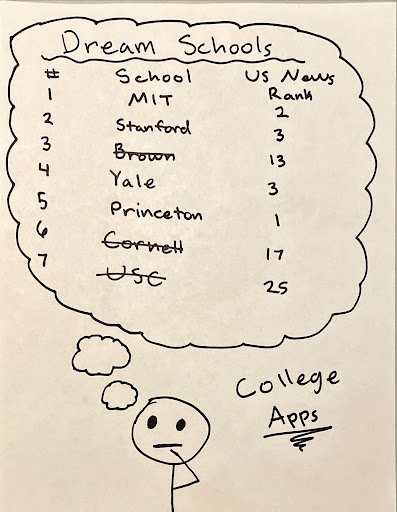Which College Rankings Matter?

Picture by Aaron Limb
December 7, 2022
For most high school students, the vague idea of attending college comes into sharp focus during their junior year: a time when the realities of one’s high school accomplishments are matched against a list of colleges to which one plans to apply.
The goal is to get accepted into the best college possible, given one’s achievements and ability to afford it. Still, before choosing the best school for you, you must determine which colleges are good and worth applying to when there are more than 3,800 accredited colleges in the U.S.
For many students and their parents, U.S. News and World Report is the initial source that provides an accurate college rankings list. This news magazine has been ranking colleges for over 30 years, and when new orders are published each year, college administrators know their rank can boost or hinder a school’s reputation. This reputation influences the number and quality of students who apply, as well as decisions related to tuition and scholarships. Students find themselves held captive to these rankings; for some, getting into a top-ranked school is considered the final test in high school.
The popularity of using such a list is understandable as it summarizes multiple factors of over hundreds of undergraduate programs into a single ranked number. With the promise of such a ranked list, students and their parents quickly narrow down the list of colleges they should apply to without the pain of researching each school.
However, the legitimacy of U.S. News’ ranking has always had its critics. Some significant flaws include the method used to calculate rank and the accuracy of data collected from colleges. This has come to light in the previous year due to Columbia University’s false data scandal. Columbia provided inaccurate data to U.S. News for years to improve its rankings. As surprising as Columbia’s conduct was, what shocked many was that U.S. News does not require supervision of the data used for the ranking submissions. Considering what’s at stake, the current process encourages schools to cheat the system.
Another frequent complaint is the importance of “peer assessment” when calculating a school’s rank. Many students have criticized it as a measure of subjective reputation rather than the actual quality of education.
But this also brings to question how employers view these students. After all, getting a promising career is one of the main reasons students want to get a college diploma. Surprisingly 90% of employers do not focus on college rankings when making hiring decisions, according to a Gallup Survey. In this case, employers focus more on relevant work experience and internships. Given this, it is sensible to look up rankings within a specific subject instead of relying on generalized school rankings such as those provided by U.S. News. For example, if a student’s goal is to work in computer science with one of Silicon Valley’s top tech companies, the “Top Feeder Ranking” may be a good start as it ranks colleges most hired by Silicon Valley tech firms.
A college education is one of the most significant investments for most individuals. Getting it right matters, so when relying on published rankings, ensuring students understand how the order is calculated and related to their future careers is extremely important.
Throughout my childhood, I witnessed first-hand siblings applying for colleges. Though I was unaware of how applications worked, I was later told what schools they had applied to; they were all top 25 universities on US News. For future students considering college, try to find more reliable lists regarding the actual quality of education for a specific major rather than using generalized and inexact college rankings.



